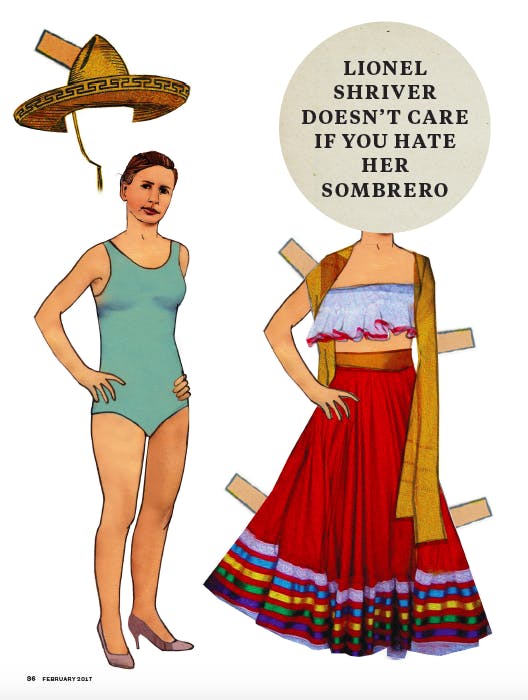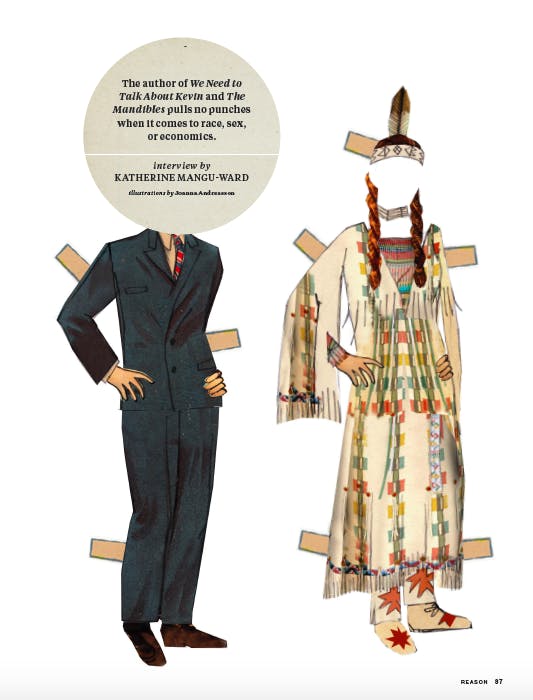If the right believes that cultural appropriation is not offensive, why are they making paper dolls that ridicule other cultures? Lionel Shriver was the keynote speaker at a private party for the libertarian magazine Reason held in New York City this week. At the party, Reason circulated a paper doll of Shriver, along with several options for “dressing” her. The paper outfits included Native American women’s clothing, a cowgirl’s, a South Asian woman’s sari, and of course a sombrero. The images in the handout originally ran in the February 2017 issue of Reason as illustrations for an interview with Shriver (though the full set of images did not appear in the article’s online version).

The sombrero is a reference to Shriver’s comments at the Brisbane Writers Festival in 2016. During her speech, Shriver described “the bramble of thorny issues that cluster around ‘identity politics.’” A group of students at Bowdoin College who wore sombreros at a tequila-themed birthday party, she lamented, were subsequently accused of cultural appropriation by the student government. Shriver believed that the outrage over this incident would have serious implications for fiction writers, who would feel they could not create a variety of characters. As Reason’s editor in chief Katherine Mangu-Ward put it, “Shriver raised the specter of being ‘obliged to designate my every character an aging 5-foot-2 smartass, and having to set every novel in North Carolina,’ which would surely make for dull reading.” Shriver then took out a sombrero and placed on her head in front of the audience, claiming that writers needed to “preserve the right to wear many hats.”
Shriver makes a critique of cultural appropriation that is shared by many on the right. Cultural appropriation, she argued in her Brisbane speech, is actually a mark of appreciation for other cultures: “Exchanging ideas and practices,” she proposed, “is self-evidently one of the most productive, fascinating aspects of modern urban life.” In a similar vein, New York Times opinion writer Bari Weiss recently insisted that “culture should be shared, not hoarded.” In her Reason interview, Shriver said that her “only regret with the way it became this international incident” was that “in the very act of dismissing a concept with no merit,” she had in fact “helped to perpetuate it.”
At Brisbane, Shriver argued that the concept of cultural appropriation was crushing free expression; it was a freedom of speech issue, she said. Yet it wasn’t Shriver’s words that made her speech attract so much attention. Shriver turned the wearing-of-hats metaphor (the author must become many people, do many types of thought) into a literal hat. I personally responded to this nonverbal gesture more strongly than to her words: the donning of a sombrero, an item commonly used to summarize and deride Mexican culture by, say, drunk white college students on Cinco de Mayo.
Lionel Shriver is wearing a sombrero while discussing right to be a bigot. It is quite a confronting start to #bwf16 pic.twitter.com/2Cjl2cl5yy
— Dr Kirstin Ferguson (@kirstinferguson) September 8, 2016
The paper dolls that Reason distributed reenact this gesture yet again, and give the lie to Shriver’s claim that appropriation is mere appreciation. There’s a difference between sharing in another culture and making use of it in a condescending way. The paper outfits, which are in some cases strongly marked ethnically, reduce identity down to costuming. The figures are headless. The illustration is lighthearted, but this gesture of reduction—of complex peoples and histories to empty and headless outfits, interchangeable and undifferentiated—makes the joke feel clumsy and shallow. A culture is not something that you can shrug on and off like a jacket. People are not dresses. People are not hats.

That Reason distributed these images at a private party in promotion of its keynote speaker is further testament to the right’s lack of understanding of the actual issues that surround “cultural appropriation” and make it a sensitive subject.
When contacted by the New Republic for comment, Shriver wrote that, “There is nothing overtly offensive about wearing a straw hat that keeps out the sun.” She continued: “This whole ludicrous ‘appropriation’ issue first started to fester in fashion, which makes the costuming joke in that paper doll sheet apt. There is nothing insulting about wearing outfits from other cultures. It’s a form of appreciation, of harmless entertainment, of taking joy in other people’s way of doing things. My parents often picked up clothing during their travels, and when my mother donned a sari at a party it was because she found the fashion beautiful and exciting to wear. Not because she was poking fun at Indians for whom she felt contempt.”
As for the paper doll illustration, Shriver told the New Republic: “I thought it was utterly charming—inventive, playful, and funny. The event on Monday night was a hoot, and it was a relief for me to find that there are other people out there who still have a sense of humor, do not want to impose their version of righteousness on others, and have some feeling for a ‘free country’ as something more palpable than an empty slogan. The term ‘libertarian’ has been much tarnished by association with some rather strange people, but these folks were sensible and sane (if by the end a little tipsy).”
